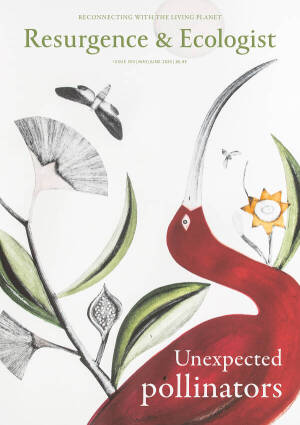“Nature is not our garden,” explains zoologist and researcher Mia Canestrini, hiking through the pristine forests of her home country on the slopes of the Dolomites in Italy. This mountainous landscape and the landworkers who live here – including a mushroom forager, a shepherd, a boar hunter and a wildlife tour guide – are at the heart of this rewilding documentary with a difference. While the film is speckled with breathtaking visuals of wolf packs roaming the Alpine foothills, the real focus is on the people who are learning to share their territory with these animals, thriving in their native lands for the first time since their near eradication in the mid-20th century.
But it was not just the wolves’ success – or the breathtaking cinematography – that left me feeling cautiously hopeful by the end of this film. America’s Yellowstone experiment was one of the first to introduce the idea of keystone rewilding to a mainstream audience, with their reintroduced wolf packs changing the shape of the entire landscape through revitalised predator, prey and plant relationships. In the face of the climate crisis, making our landscapes healthier and more resilient has never been more important. As this documentary shows, in the last few decades there has been a cultural shift towards European wolf populations that suggests their role in rebuilding broken ecosystems may be coming to the fore. One shepherd acknowledges that the wolves are, by nature, his greatest enemy, but at the same time questions whether it is right to blame the wolves for destabilising his business, instead of blaming the profiteering systems that have brought traditional, sustainable farming practices like his to their knees.
Set against the backdrop of the Italian forests in autumn, the season of delicate balance between life and death, the colours of the landscape seem to be reflected in the coats of the wolves themselves. They are, and have always been, an integrated part of this land. And yet the timing of this film, which came out in 2024, is no accident. In December 2014, the Bern Convention’s Standing Committee voted to lower the protection status of wolves in a move considered by many to be politically motivated, rather than science-based. With the help of this emotive yet rational film, campaigners are hoping to reverse their decision and continue safeguarding the future of people and wolves together. “The wolf”, says zoologist Luigi Boitani, “is no longer an animal with two ears, four legs and one tail: it is a political subject.”
Tiffany Francis-Baker is a Nature writer and illustrator from the South Downs, Hampshire. Her latest book is Ebb and Flow: A Guide to Seasonal Living (Bloomsbury).







